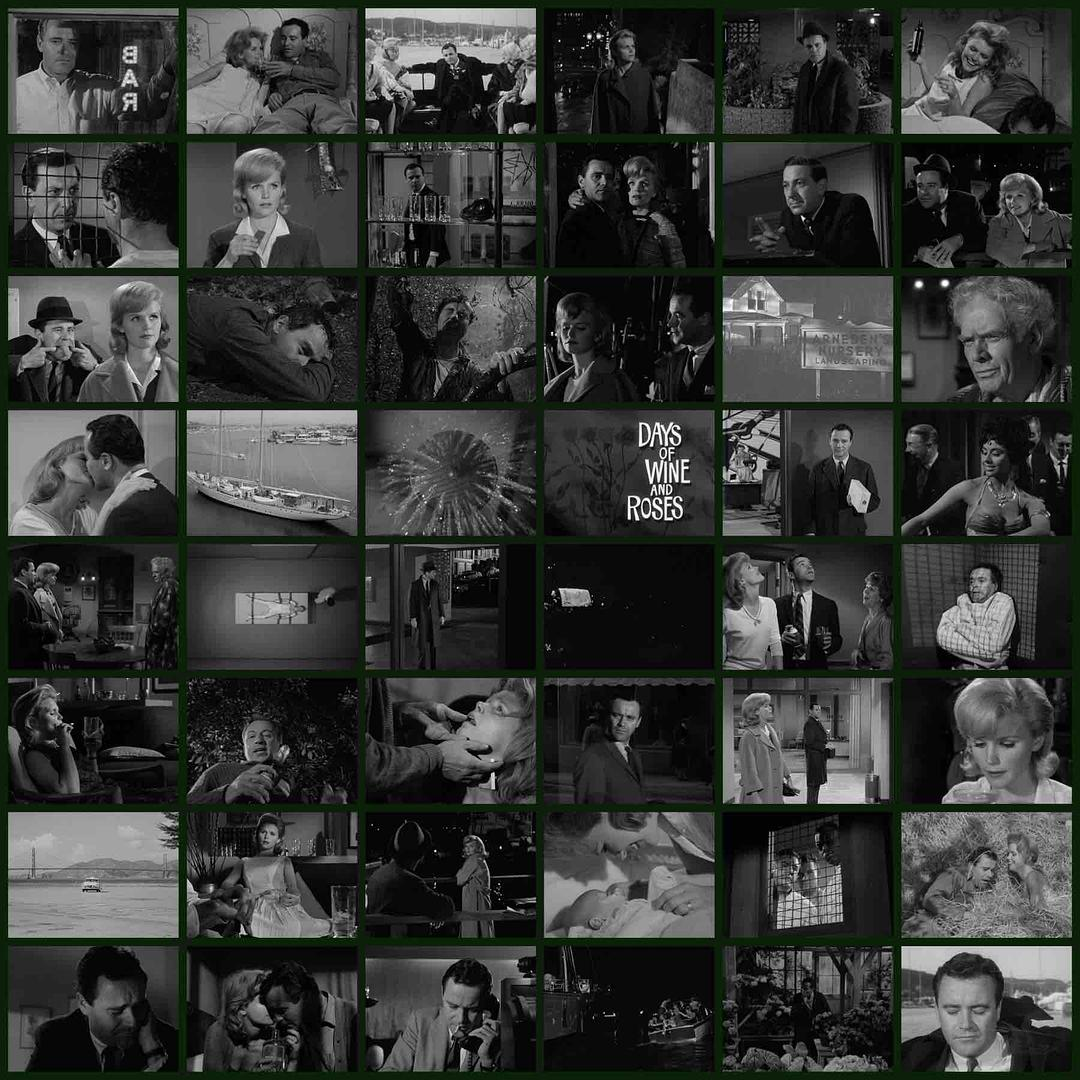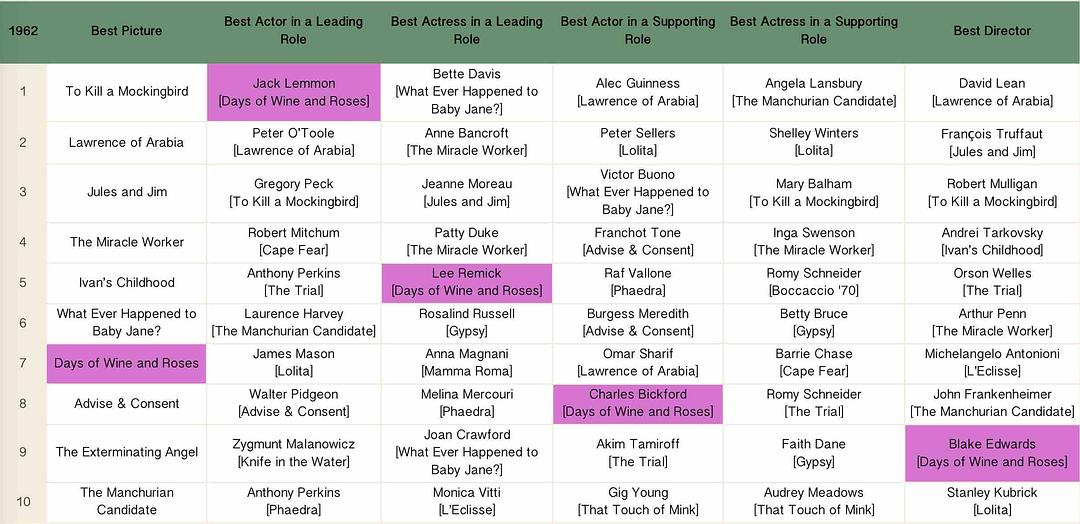1、杰克·莱蒙,丽·莱米克,查尔斯·比克福德,杰克·克卢格曼 主演的电影《相见时难别亦难》来自哪个地区?
爱奇艺网友:电影《相见时难别亦难》来自于美国地区。
2、《相见时难别亦难》是什么时候上映/什么时候开播的?
本片于1962年在美国上映,《相见时难别亦难》上映后赢得众多观众的喜爱,网友总评分高达4998分,《相见时难别亦难》具体上映细节以及票房可以去百度百科查一查。
3、电影《相见时难别亦难》值得观看吗?
《相见时难别亦难》总评分4998。月点击量1次,是值得一看的剧情片。
4、《相见时难别亦难》都有哪些演员,什么时候上映的?
答:《相见时难别亦难》是1962-12-26上映的剧情片,由影星杰克·莱蒙,丽·莱米克,查尔斯·比克福德,杰克·克卢格曼主演。由导演布莱克·爱德华兹携幕后团队制作。
5、《相见时难别亦难》讲述的是什么故事?
答:剧情片电影《相见时难别亦难》是著名演员杰克· 代表作,《相见时难别亦难》免费完整版1962年在美国隆重上映,希望你能喜欢相见时难别亦难电影,相见时难别亦难剧情:一对酒鬼夫妻,尝试一切办法过上常人的生活,结局令人心碎…… 1963年四项奥斯卡提名(最佳男主角、最佳女主角、最佳艺术指导、最佳服装设计),获最佳原创歌曲奖 Jack Lemmon和Lee Remick分获1963年圣塞巴斯蒂安电影节最佳男女演员奖

Tackling alcoholism head on, DAYS OF WINE AND ROSES is an adaptation of J.P. Miller’s 1958 teleplay, and director Blake Edwards’ capacity of handling a simmering drama is put to test, and the result is quite propitious, unlike Billy Wilder’s excellent solitary toper misery in THE LOST WEEKEND (1945), here the situation is a classic case of folie à deux.
San Francisco PR agent Joe Clay (Lemmon) is a man of principles, yet he is often saddled with the seamy job of recruiting female companions for his company’s affluent clients. Under that premise, he first meets Kirsten Arnesen (Remick) and unceremoniously assumes that she belongs to the escort bracket, and only later to his discomfiture, realizes that she is a secretary, nonetheless doted by her affluent boss because of her prettiness.
Not so much a meet-cute as a romance precipitated by misapprehension, Edwards nimbly crafts an “elevator pitch” to sell a righteous Joe to a miffed Kirsten, who initially brushes aside his gesture of peace-making. To Joe’s obfuscated delight, after he lashes out on her for being too uppity to please and “secretary” is just a glorified designation for some gal with a pretty face , Kirsten takes an about-face and reconsiders the option of a date with him (talking about a girl’s illogical mutability), Joe’s “principles” finally convince Kirsten that he is the marry kind, they wed soon after and have a daughter, yet during their very first date, Joe has unwittingly sowed the seed of alcoholism to a hitherto teetotal Kirsten, which in time, will tear their family apart.
Every time before a snifter of hard liqueur goes down the hatch, Joe utters “magic time”, as if it is a mojo to invoke the liquor’s magical power to make him feel good, but that magical potion has severe sequelae, it destroys his career, put on a strain in his marriage and worst of all, indirectly pushes Kirsten down the same vicious circle of an inveterate heavy drinker, and she becomes an even worse case.
While the story tactfully soft-petals Joe’s incontrovertible responsibility as partially the scourge of Kirsten’s piteous self-abandonment (as Kirsten’s dour-looking father, Charles Bickford finally nerves himself up and gives Joe some piece of his own mind near the end, but that comes a shade too late), the script unavoidably smacks of sexism by granting Joe an ideal role model of an AA participant who finally gets the better of his jones, at the same time nudging Kirsten to the abyss of self-denial and diminishing willpower. This is the only gripe one can lay claim to the otherwise fairly outstanding script, probing strenuously and effectively to the nexus of the ubiquitous issue of alcohol dependency.
Beyond the shadow of a doubt, DoWaR boasts one of Lemmon’s most phenomenal performances, Lemmon wades through Joe’s journey with substantive lived-in commitment, running the gamut from gentlemanlike courtship, fanatical desperation to pathos-driven plead, not to mention the utterly visceral impersonation of delirium tremens when confined in a straitjacket, which can knock this reviewer dead stone cold. Remick, on the other hand, heftily retains her side of extraordinariness to limn Kirsten’s slippery slope with stern disillusion and inveterate helplessness, even though she is lumped with the short end of the stick in the dichotomous gender design. A cogent cautionary tale powered by two copacetic performers, and a slap on the Edwards’ back to his aptitude in orchestrating it in its finest order, not least for that bodacious final shot, a man and his anathema are superimposed in the same frame when a woman’s hope fizzles out despondently.
referential entries: Billy Wilder’s THE LOST WEEKEND (1945, 7.9/10)

开头他俩如此不对付,让我非常好奇怎么成的夫妻。
女主看不上男主这很能理解,又抠门又拘谨不会说话。
结果男主电梯里把女主骂了一顿,女主觉得这人真是好单纯好不做作,和那些妖艳贱货的老头子好不一样。竟然还主动提出吃晚饭……
然后女主发现男主各种单纯不做作的闪光点,然后一个不注意他俩就结婚了。
这个女主开心的点总在我觉得比较尴尬的地方,比如全体大厦的租客因为他的杀虫剂嚷嚷起来的时候。
开始担心他俩的孩子浸淫在这对夫妻的酒精里会不会脑残……
男主脱衣舞跳的不错
女主老爸也是心酸,眼看着孩子被酒鬼坑了
他俩真的总有奇特的共同笑点
他俩的女儿真是长得贼快,除了头发看不出和他们有什么血缘的样子
这部片子重点应该是女主,看着她一步一步地被沦陷,到底是因为什么?爱?爱人?生活压力?欲望?她在旅馆里幽怨的样子真是太惨了。
男主还是软弱了些,拒绝妻子回家的那段话更像是自保,为了自己还能活下去,拒绝带上当初被自己拖下水的妻子